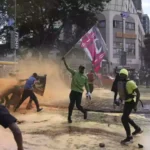Recently, Logos Olori – a Nigerian singer who is signed to Afrobeats superstar Davido’s music label – released a video with supposedly Muslim men dancing to his song Jaye Lo in front of a mosque. After an outcry, the controversial video had to be taken down by Davido because it sparked the ire of Muslims in Nigeria. There were public burnings of Davido’s image on posters in the Muslim north and fervent calls to have him remove the video.
What caused the offence was images of Logos Olori sitting atop a mosque singing his song while a group of Muslim men dressed in traditional white robes began to pray below, but then erupted in dance. There are sectors within the Islamic faith that aspire to a return to the “true” values of Islam supposedly unsullied by corrupt western influences.
As a scholar of philosophy who has studied the dynamics of ethnicity, religion and political conflicts in Nigeria for decades, I’ve watched these tensions spill into all aspects of the country’s social and cultural existence. These tensions have made understandings of nationhood, individual rights and the collective good quite difficult to define.
In view of the Logos Olori furore – which pits freedom of artistic expression against religious sensitivities – it’s quite clear that Nigeria continues to be deeply polarised along ethnic, religious, cultural and political lines so that outbreaks of conflict or even violence are never far from the surface. I argue that the singers have failed to respect these tensions and their consequences.
Religious tensions
Nigeria, a largely Muslim-dominated country, has been plagued by religious conflicts in contemporary times. From 1980 the Maitatsine Riots engulfed the north. The religious uprising, which resulted in thousands of deaths, was an attempt to impose a “purer” version of Islam.
Before then, in 1804, the leader of Fulani Jihad in the north, Usman Dan Fodio, had sworn to dip the holy Koran in the Atlantic Ocean in the south. He was halted, but succeeded in creating one of the most formidable sultanate kingdoms in Africa, the Sokoto Caliphate.
Although ostensibly a secular state, Nigeria also has several states in the north that subscribe to sharia law or rule by the Islamic legal code. The country is governed by powerful religious sentiments – both Islamic and Christian – that make it, at most times, ultra-conservative.
In south-west Nigeria, the region Davido comes from, religious tolerance used to be significant with members of the same family belonging to different faiths – Christian, Islamic and indigenous spirituality. After independence in 1960, that would gradually evaporate. Religion has been hijacked by political opportunists and demagogues for selfish interests. This has fuelled ethnic and political tensions.
Freedom of expression
A sophisticated way of assessing the Logos Olori controversy is to state that it’s about the right to freedom of expression. But on the streets, it’s often unveiled as a tussle to establish “purer” standards of religious practice.
Public intellectuals such as Nobel Prize-winning Nigerian author Wole Soyinka have weighed in, supporting the artist – just as he did in the Salman Rushdie case.
In 1989, Indo-British novelist Rushdie published The Satanic Verses, a novel which led to a fatwa issued against him. According to Muslim sensibilities, Rushdie had desecrated the holy name of Prophet Muhammad, may peace be upon God’s messenger, in his irreverent storyline.
Art or gimmick?
But there is also a larger question; is this really art or a lowbrow attention-seeking gimmick?
Soyinka argues that all religions use dance to express themselves and that dancing nuns in a US movie like Sister Act are considered part of popular culture. But young African-American women who twerked atop the Elmina Castle in Ghana were criticised for bringing the slave dungeon into disrepute. It was as if they were defaming the memory of those who lost their humanity and lives during the transatlantic slave trade. Perhaps to them they were exercising their creative freedoms, but clearly to most they were just being unduly offensive.
In the elevation of the risqué and the substituting of art with entertainment there is also a blurring of the distinction between the sacred and the profane. This is exacerbated by social media sites like TikTok and Instagram.
What was the point of Logos Olori’s video? That Muslim men were permitted to be funky and carefree in front of a holy place? If so, he misread his society. In 2002, Nigeria was to host the Miss World beauty pageant. Muslim protesters, enraged by the over-sexualisation and therefore devaluation of women, went on a rampage that destroyed lives and property and caused the event to be cancelled.
In my view, Logos Olori’s portrayal wasn’t conceived as a piece of art but a gimmick (and perhaps a form of cultural appropriation) that ultimately backfired. After all, like most Afrobeats tunes, Jaye Lo is largely about the pursuit of material riches and the good life – not profound social messaging.
The common good
Most entertainment clearly isn’t art and the limits of individual rights and freedoms are often defined by the effects they have on the common good and social cohesion.
At face value, it would appear that the men dancing in the video were harmless in their intentions. But they were also engaged in their act of frivolity within a context loaded with religious signification, symbolism, reverence and imminent violence.
The contexts in which such acts of public expression are displayed need to be considered. At what point does the individual exercising their rights to self-expression step back and consider the consequences of their acts? After a few dead bodies are lying around in some ditch, or before then?
For a polity as diverse as Nigeria in ethnic, cultural, religious and political terms, the issue of freedom of expression and individual liberties in relation to the common good has been problematic. The country’s history has seen a civil war, the rise of Islamic terrorist group Boko Haram, numerous ethnic and religious conflicts and military coups that attest to the difficulties of managing these faultlines.
Source : Yahoo
















